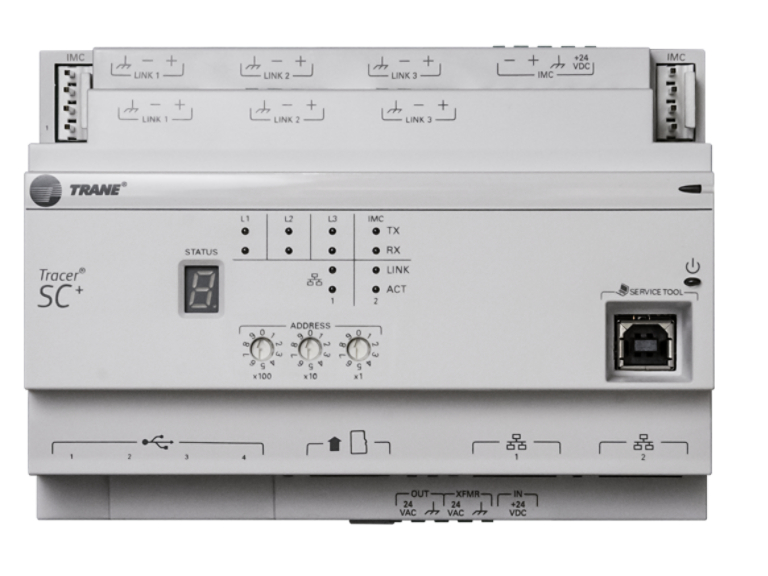A chiller plant is a central cooling system in large facilities that use chillers to produce chilled water. This chilled water is distributed throughout the building to provide air conditioning by removing heat from indoor spaces.
Overview
Expert approach to chiller plant optimization.
Tracer® chiller plant control balances proven sequences with custom strategies to drive reliability, efficiency and confidence in daily operation.
-
Engineered Expertise
Tracer® chiller plant control is embedded within Tracer® SC+ to automate sequences of operations and perform critical plant functions.
-
System Experts
Trane experts adjust sequences to serve your building’s unique needs to make your chiller plant more adaptable, efficient and ready for what's next.
-
Connected Services
Connected services monitor chiller plant performance, collect decision data, and help maintain optimal performance over time.
Key Features
Greater chiller plant efficiency starts here.
With more equipment online, tighter energy goals, and more technology to manage, chiller plant control has become a strategic function to deliver results.
-
Energy Improvements
Average commercial buildings waste about a third of the energy consumed. An optimized chiller plant can lower energy costs and reduce carbon emissions.
-
Improved Productivity
Chiller plant management takes tasks off your staff’s to-do list. Empower employees to work more efficiently and focus on other tasks.
-
Less Stress
Chiller plant control manages the rotation, staging and sequencing of multiple chillers. Rest easier knowing HVAC is being holistically managed.
-
Performance Assurance
Help maintain system performance near its original design. Chiller plant control delivers end-to-end support and expert service gained through years of experience.
-
Seamless Integration
Tracer controls support multiple protocols, ensuring seamless integration with your existing infrastructure.
-
Ready-made Compliance
Achieve and maintain industry standards effortlessly. Engineered applications automate the implementation of ASHRAE 36 Guidelines.
FAQs
Your questions about chiller plant control, answered.
A chiller plant works by circulating water through chiller units, which remove heat from the water through refrigeration cycles. The chilled water then travels through a network of pipes to air handlers or fan coil units, where it absorbs heat from the building spaces. The warm water returns to the chiller to repeat the process. The plant also typically includes pumps, cooling towers (for heat rejection), and controls to manage its operation.
Chiller plant optimization provides several key benefits, including boosting energy efficiency, lowering costs, improving occupant comfort and sustainability, enhance reliability, and minimizes maintenance, making operations smoother, greener, and more cost-effective.
Choose a chiller plant control system that is compatible with your existing equipment, offers strong analytics, and proven energy savings. A Trane account manager can help guide you through options to ensure the best fit and support for your facility’s goals.
Through advanced programming and analytics, chiller plant control monitors and collects performance data. These engineered sequences monitor the conditions of the system and automatically adjust in real-time. View system data through intuitive user interfaces and dashboards and set up reporting and alerts for faults or abnormal conditions.
Chiller plant optimization reduces overall energy use by adjusting equipment operation to match building demand, using advanced controls and analytics. This maximizes system efficiency, lowers energy costs and reduces carbon emissions.
Tracer chiller plant control applications strategically manage the rotation, staging and sequencing of multiple chillers. Many functions are included and coordinated to maximize equipment life, optimize energy use and maintain comfort:
- Chiller staging
- Pump pressure reset
- Chilled water reset
- Free cooling
- Heat recovery integration
- Enhanced cooling tower stating
- Chiller/tower optimization
- Thermal storage integration
Built on open standard protocols, chiller plant optimization can be integrated with building automation and energy management systems, enabling seamless data sharing and coordinated control for enhanced efficiency.
Resources & Insights









